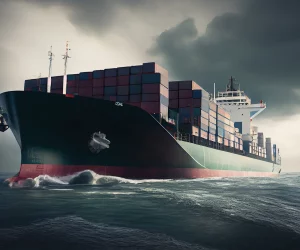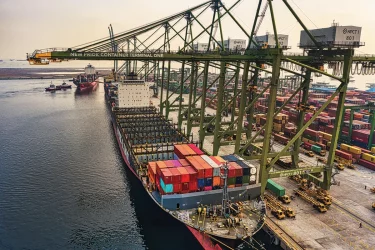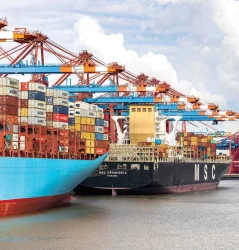The global shipping crisis has left many importers facing shipment delays, increasing costs and missed deadlines. However, new shipping rules enforced by the Federal Maritime Commission (FMC) have given U.S. importers the power to push back against unfair late fees.
The Global Shipping Crisis
The global shipping crisis began in 2020 as the COVID-19 pandemic caused disruptions worldwide. The closure of factories and ports resulted in a significant reduction in shipping capacity, leading to a surge in demand for shipping services. Additionally, a shortage of shipping containers and a backlog of ships waiting to dock at ports created further delays and increased costs.
The shippers of furniture, electronics and clothing claim they are among the worst hits during the pandemic. Ocean carriers added hefty fees for delays in picking up and returning containers, but the importers had no chance of moving the boxes because of circumstances beyond their control.
They are raising their voices against the prohibitive fees. “I don’t like being a victim, and I felt like I was victimized without recourse,” Ryan Frey, an importer of lithium batteries, said of the fees. Lion Energy LLC’s company imports about 800 containers a year, and he felt that his company had little power to dispute the charges.
The Role of the Federal Maritime Commission in Reducing Late Fees
The Federal Maritime Commission (FMC) is an independent agency regulating the U.S. international ocean transportation system. In response to the shipping crisis, the FMC has implemented new rules to reduce the burden on U.S. importers.
One of the key changes introduced by the FMC is a prohibition on shipping lines charging detention and demurrage fees when shippers cannot pick up their cargo due to factors beyond their control. Shipping lines typically charge these fees when cargo is left at a terminal or port for longer than the allotted time.
Under the new rules, importers are only responsible for detention and demurrage fees when they can retrieve their cargo within the agreed-upon timeframe. If delays occur due to factors beyond their control, such as port congestion or equipment shortages, the shipping lines are prohibited from charging fees.
Importers Fight Back Against Unfair Fees
The new rules introduced by the FMC have given U.S. importers the power to push back against unfair late fees. Importers who have been charged fees for delays beyond their control can now file complaints with the FMC, which has the authority to investigate and take action against shipping lines that violate the new rules.
The new rules have also led to increased transparency in the shipping industry. Shipping lines are now required to provide detailed information on their detention and demurrage policies, making it easier for importers to understand their rights and dispute unfair fees.
According to freight forwarders, who handle cargo on behalf of shippers, carriers, and private terminal operators have been known to withhold containers until fees are paid, leaving forwarders and their customers with no choice but to pay and dispute the charges later. Lion Energy’s Chief Operations Officer, Mr Frey, confirmed that the Utah-based company had paid fees ranging from hundreds of dollars to over $10,000 per container, in addition to already high shipping rates in 2021 and the first half of 2022, often for delays that were outside the company’s control.
Improved and Faster Claims Process
 The new shipping law endorses an FMC rule published in 2020, stipulating that late fees should only be used to incentivize importers and exporters to keep freight moving. The rule also states that if a shipper cannot move a container due to factors such as bottlenecks, charges should not be applied.
The new shipping law endorses an FMC rule published in 2020, stipulating that late fees should only be used to incentivize importers and exporters to keep freight moving. The rule also states that if a shipper cannot move a container due to factors such as bottlenecks, charges should not be applied.
Previously, shippers could dispute late fees, but the new law now provides a more expedited claims process through the FMC, allowing shippers to challenge charges quickly and shifting the burden of proof to carriers to prove that fees are valid.
While John Butler, President and CEO of the World Shipping Council, a trade group representing carriers, welcomes the expedited claims process, he is concerned about proposed rule changes that may further weaken carriers’ and terminal operators’ ability to collect fees. He worries that if there is no real incentive for carriers, port congestion may reoccur even without massive cargo increases.
On the other hand, Rich Roche, SVP at Mohawk Global Logistics, who helps shippers dispute charges, said the new shipping law changes simplified and strengthened the claims process for shippers.
Additionally, FMC’s involvement added “teeth” that encouraged carriers to settle claims. Since the law’s enactment, the FMC has received around 250 complaints under the new expedited process, with over 80 complaints qualified for review. This led to almost $800,000 being refunded or waived.
During the annual TPM23 shipping conference in Long Beach, California, sessions on the tightened shipping rules attracted standing-room-only crowds to learn how to dispute charges and file complaints with the FMC. However, some shippers have been sceptical about the FMC’s willingness to intervene in disputes, leaving many U.S. companies to feel powerless to a small group of Asia- and Europe-based carriers that control most of the world’s ocean trade.
During one conference session, Alison Leavitt, Managing Director of the Wine and Spirits Shippers Association, expressed her scepticism, saying, “To be blunt, I think they were in the pocket of carriers for many, many years. That has vastly changed. They are now looking out for the interests of the USA shipper.”
In an interview, FMC Chairman Daniel Maffei shared that the new law has authorized significant funding increases for the FMC, allowing it to expand its workforce by approximately one-third and boost its oversight, enforcement, and investigative activity. He said, “In the last couple of years, we have gone from being, for the most part, a very passive regulatory agency to a very active one.”
 The expedited complaints process applies only to charges assessed after the shipping act was passed. However, shippers can still dispute fees that predate the law under earlier FMC rules. Lion Energy’s COO, Mr Frey, intends to challenge as many of the charges as possible, both before and after the act passed, saying, “I am going to audit the hell out of it.”
The expedited complaints process applies only to charges assessed after the shipping act was passed. However, shippers can still dispute fees that predate the law under earlier FMC rules. Lion Energy’s COO, Mr Frey, intends to challenge as many of the charges as possible, both before and after the act passed, saying, “I am going to audit the hell out of it.”
Protecting Shippers’ Interests
The new shipping law provides an expedited claims process that empowers shippers to challenge charges quickly, shifting the burden of proof onto carriers to prove that fees are valid. While some carriers have welcomed the expedited claims process, others remain concerned about proposed rule changes that may further weaken carriers’ and terminal operators’ ability to collect fees.
Despite this, the FMC has seen a significant increase in claims filed and settled since the law’s enactment, demonstrating the agency’s commitment to actively regulating the industry and protecting the interests of U.S. shippers.